

Meet the Chinese consumer of 2020 - McKinsey Quarterly - Retail & Consumer Goods - Sectors & Regions. Most large consumer-facing companies realize that they will need China to power their growth in the next decade.
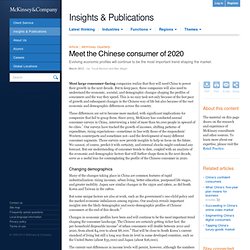
But to keep pace, these companies will also need to understand the economic, societal, and demographic changes shaping the profiles of consumers and the way they spend. This is no easy task not only because of the fast pace of growth and subsequent changes in the Chinese way of life but also because of the vast economic and demographic differences across the country. These differences are set to become more marked, with significant implications for companies that fail to grasp them. Since 2005, McKinsey has conducted annual consumer surveys in China, interviewing a total of more than 60,000 people in upward of 60 cities.
276na6. French City Implements Virtual Currency To Avoid Financial Ruin. The best use of £50bn QE? Bypass the banks and go direct to green projects. As the Bank of England today decides to introduce a further £50bn into its programme of quantitative easing (QE), it's hard to see why it should be any more successful than the eye-watering £275bn it has already created, which has failed to reach small businesses or create jobs.
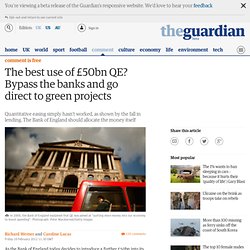
Yet things could have been very different. In 2009, the Bank of England explained that QE aims at "putting more money into our economy to boost spending", while relying on the banking system to put the money to work. It said: "Banks end up with more reserves as well as the money deposited with them. Increased reserves mean banks can increase their lending to households and businesses, making it easier to finance spending. " But banks are not increasing their lending. There is a reason for the otherwise puzzling central bank focus on handing the new QE money to dysfunctional banks: central banks only create 3% of the money supply. Measures to increase bank credit need to be stepped up. EU's aviation charge is a drop for China's airlines. 5 January 2012Last updated at 15:43 Chinese airlines now rank among the world's biggest and most profitable More shots are being fired in the war of words over the EU's new law requiring airlines to pay for their greenhouse gas emissions.
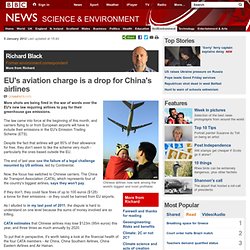
The law came into force at the beginning of this month, and carriers flying to or from European airports will have to include their emissions in the EU's Emission Trading Scheme (ETS). Following House passage, mirror bill introduced into US Senate to block US airlines from participating in EU ETS on GreenAir Online. Thu 8 Dec 2011 – Following the adoption of the H.R. 2594 bill in the US House of Representatives late October, Senator John Thune has introduced a mirror bill in the Senate.

The bill instructs the US Secretary of Transportation to prohibit US civil aircraft operators from participating in what it describes as the EU’s unilaterally established scheme, similar language to that of H.R. 2594. The move was welcomed by trade body Airlines for America, formerly the Air Transport Association, who estimate the EU ETS will cost US airlines and passengers more than $3.1 billion between 2012 and 2020. The Experts: How the U.S. Oil Boom Will Change the Markets and Geopolitics. 2 Billion Jobs to Disappear by 2030. 4 Trends Shaping the Emerging “Superfluid” Economy. Image by ericaglasier.com @EricaGlasier Humanity and technology continue to co-evolve at an ever increasing pace, leaving traditional institutions (and mindsets) calcified and out of date. A new paradigm is emerging, where everything is increasingly connected and the nature of collaboration, business and work are all being reshaped.
In turn, our ideas about society, culture, geographic boundaries and governance are being forced to adapt to a new reality. While some fear the loss of control associated with these shifts, others are exhilarated by the new forms of connectivity and commerce that they imply. Transactions and interactions are growing faster and more frictionless, giving birth to what I call a “superfluid” economy.
Center for the Advancement of the Steady State Economy. Will New Zealand be the first developed country to evolve a steady-state economy? Posted on January 11, 2012 by admin Jack Santa Barbara New Zealand will inevitably make a transition to a steady-state economy.
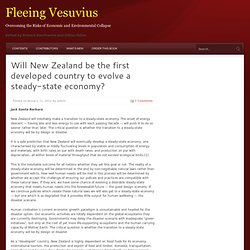
The onset of energy descent — having less and less energy to use with each passing decade — will push it to do so sooner rather than later. The critical question is whether the transition to a steady-state economy will be by design or disaster. It is a safe prediction that New Zealand will eventually develop a steady-state economy, one characterised by stable or mildly fluctuating levels in population and consumption of energy and materials, with birth rates on par with death rates, and production on par with depreciation, all within levels of material throughput that do not exceed ecological limits.[1] Uld Ecuador be the most radical and exciting place on Earth? President Rafael Correa's approval ratings are in excess of 70%.
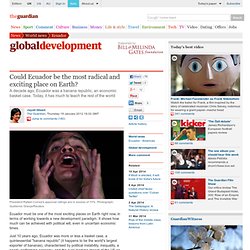
Photograph: Guillermo Granja/Reuters Ecuador must be one of the most exciting places on Earth right now, in terms of working towards a new development paradigm. It shows how much can be achieved with political will, even in uncertain economic times. Just 10 years ago, Ecuador was more or less a basket case, a quintessential "banana republic" (it happens to be the world's largest exporter of bananas), characterised by political instability, inequality, a poorly-performing economy, and the ever-looming impact of the US on its domestic politics. Nine trends defining the future world of work. Global economic crisis: could we have predicted it? - Forecasting Net. Following the 2008 credit crunch, the global economy entered a serious recession, marking negative growth rates at 2009, for the first time in 60 years.
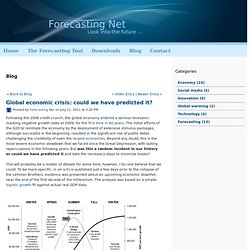
The initial efforts of the G20 to reinitiate the economy by the deployment of extensive stimulus packages, although successful in the beginning, resulted in the significant rise of public debts challenging the credibility of even the largest economies. Beyond any doubt, this is the most severe economic slowdown that we faced since the Great Depression, with lasting repercussions in the following years. But was this a random incident in our history or could we have predicted it and take the necessary steps to minimize losses? This will probably be a matter of debate for some time, however, I for one believe that we could. To be more specific, in an article published just a few days prior to the collapse of the Lehman Brothers, evidence was presented about an upcoming economic downfall, near the end of the first decade of the millennium.
2 Billion Jobs to Disappear by 2030. BP: Renewables growth to outstrip fossil fuels - 19 Jan 2012. Are We In a Global Recession? More than Half Say Yes. Concerns about global recessionary conditions subsided slightly in Q4 2012, but negative sentiment about the economy remains considerable for a majority of consumers around the world.
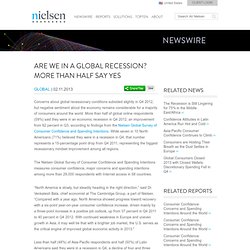
More than half of global online respondents (59%) said they were in an economic recession in Q4 2012, an improvement from 62 percent in Q3, according to findings from the Nielsen Global Survey of Consumer Confidence and Spending Intentions. While seven in 10 North Americans (71%) believed they were in a recession in Q4, that number represents a 15-percentage point drop from Q4 2011, representing the biggest recessionary mindset improvement among all regions.
The Nielsen Global Survey of Consumer Confidence and Spending Intentions measures consumer confidence, major concerns and spending intentions among more than 29,000 respondents with Internet access in 58 countries. “North America is slowly, but steadily heading in the right direction,” said Dr. Other notable findings include: Capitalism 4.0 by Anatole Kaletsky. Anatole Kaletsky sometimes seems like the Stephen Hawking of economics.
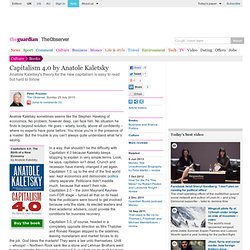
No problem, however deep, can faze him. No situation he finds is beyond solution. He goes – wisely, lucidly, above all confidently – where no experts have gone before.